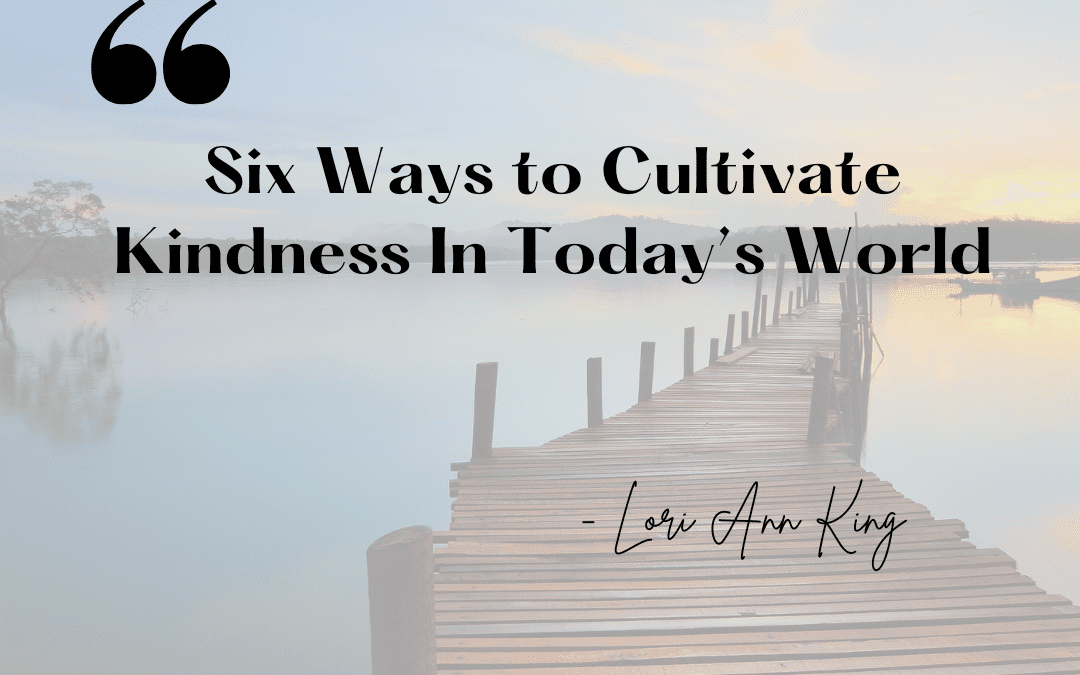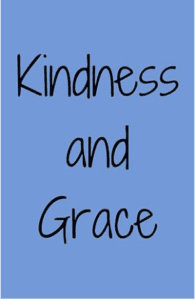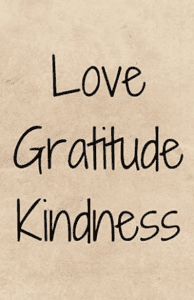Practicing kindness has the power to benefit both the giver and the receiver. It can boost the mood and self-esteem of both ourselves and the recipients of our kindness. It can also help cultivate a sense of community and even help reduce feelings of isolation and loneliness.
In a world where it often feels like no one’s looking out for you, you might wonder, “Why should I be kind in a cruel world?”
Perhaps you should be kind BECAUSE it’s a cruel world.
Do You Value Your Opinion Over Your Relationships?
Years ago, Jim and I met a couple who were estranged from their son. The result was that they hadn’t seen their granddaughter in close to a year. When we asked what happened, the couple told us how they didn’t agree with their own child’s parenting style and were frustrated that their grown children would not take their advice.
Jim said to them, in all his wisdom, “It sounds like you value your opinion and being right more than you value your relationship with your children and grandchildren.”
Talk about profound. This simple, direct statement caused the couple to pause and rethink their stance. They eventually softened, reached out, and restored their relationship with their son and his family. When they dropped their need to be right and embraced kindness, the entire family experienced more joy.
What You Focus On Grows
In today’s polarized society, where every conversation seems to turn into a heated debate, it’s easy to focus on disappointment and heartbreak over the hatred and conflict we see. But what if we chose to focus on kindness instead? Mahatma Gandhi wisely said, “Be the change that you wish to see in the world.” What you focus on grows. By being kind, you can start a positive change, not just in your own life but in the world around you.
Which Wolf Do You Feed?
Have you heard the famous legend about two wolves?
An old Cherokee is teaching his grandson about life. He tells the boy, “A fight is going on inside me. It is a terrible fight between two wolves. One is evil—he is anger, envy, greed, arrogance, self-pity, guilt, resentment, inferiority, lies, false pride, superiority, and ego.” He continues, “The other is good—he is joy, peace, love, hope, serenity, humility, kindness, benevolence, empathy, generosity, truth, compassion, and faith. The same fight is going on inside you and every other person, too.”
The grandson thinks about it for a minute and then asks his grandfather, “Which wolf will win?”
The old Cherokee simply replies, “The one you feed.”
It’s common for humans to react and “lead” with anger, defensiveness, resentment, and ego. But we all have a choice to also lead with peace, humility, kindness, and empathy. The traits and emotions we nurture and give attention to will grow stronger, whether they are positive or negative.
Ripples Of Kindness
My first job at age 16 was at Burger King, where I worked the register, taking orders. One evening, I was on the busy dinner hour. The lines were five across and deep, including families and small, hungry children.
In front of me stood an angry, belligerent, and possibly drunk human being. I don’t remember what they were so upset about. While I can’t remember their specific words, I can remember how their yelling and hostility made me feel: small, embarrassed, and anxious.
Everyone in the restaurant seemed to be looking at me. I peered around my shoulder, willing a supervisor to appear, while this customer continued to yell at me at the top of their lungs.
Finally, a manager came to the rescue and led the hostile customer away, out of view and earshot of the customers and employees in the Burger King lobby.
And while the hostile customer was removed, I was still rattled, fighting tears, my breath fast and shallow, my eyes darting around the noisy, bustling dining room, observing all the hungry guests waiting to place their orders.
Suddenly, I heard one calm, soothing, kind voice above the noise of the crowd. My ears perked up as I tried to tune in, looking around frantically, trying to find the source. The calm, soothing voice came from a woman standing before me, my next customer in my line. She’d had a front-row seat to the previous customers’ outrage and hostility.
She was smiling, speaking softly yet loud enough for me to hear. “You’re ok. Breathe. Relax. Take a deep breath in; now release it. Again. Come back to the present moment. You’re here. I’m here. You’re ok. We’ve got this. Forget everyone else for a moment; focus on my voice. You’re safe. Relax. Lower your shoulders. Clear your throat. Breathe.”
In less than 30 seconds, this stranger calmed the anxious teen I was, soothed my soul, helped me release my anxiety over being yelled at, and helped me settle into the present moment.
I relaxed.
I lowered my shoulders.
I took a deep breath.
I smiled back at her and said, “Welcome to Burger King. May I take your order?”
It’s been over thirty years, and I still remember two strangers from that day: one who showed me hostility and one who showed me kindness.
I realized long ago that I have no control over someone else’s behavior. I never know what someone else is dealing with at any given point in time. Anger and hostility may be a result of an addiction, mental illness, emotional or physical pain, or something else.
I also know that we are all connected, and kindness can have a ripple effect. One woman’s kindness toward me that day allowed me to reset, calm myself, and show kindness to her and everyone else that evening.
Being Kind When Others Are Mean
Being kind when others are mean is tough. It’s natural to want to retaliate or defend yourself. However, kindness can diffuse a situation and help others react less angrily. Your peace is your power. If you do react with tears or anger, recognize it, stop, and apologize if needed. Pivot, take a breath and start again. Offer yourself grace and acknowledge that we are all passionate about different topics and situations.
As Rumi said, “If you are irritated by every rub, how will you be polished?”
Forgiveness is an Act of Kindness
Learning how to forgive is one of the most powerful lessons in life. Forgiveness is about acceptance and letting go. When you forgive, you release the person or situation from your life, freeing yourself from anger and resentment. It helps you move forward and creates space for kindness to flourish.
Kindness is Not a Weakness
Charlotte Armitage, a media and business psychologist, explains that kindness is often perceived as a weakness, but in reality, it requires significant strength and resilience. Offering genuine kindness shows a deep level of psychological strength and self-acceptance. It’s a powerful act that comes from feeling safe and secure with who you are.
We’re All Just Walking Each Other Home
Ram Dass beautifully said, “We’re all just walking each other home.” Everyone has their own pains and battles, and we can’t always know what someone else is going through. This doesn’t excuse bad behavior, but it reminds us that “hurt people hurt people.” By recognizing this, we can approach others with more compassion and understanding.
Six Areas You Can Show More Kindness
- With Your Partner. I’m fortunate to have an amazing relationship with Jim. We don’t keep score, and we choose to look past each other’s flaws and focus on the positive. We also know that how we send each other out into the world and how we greet each other when we return matters. We choose to greet each other with kindness and a smile.
- With Your Colleagues: Whether you’re a boss or a team member, complimenting, encouraging, and appreciating your teammates is an act of kindness. You can do this during team meetings, one-on-one conversations, or emails.
- With Friends: Ask them to “tell you something good.” Let them know what you appreciate about them. My friend Shannon recently told me that she appreciates that I don’t offer her advice and that I just hold space for her and what she’s feeling or processing. I’m fortunate that she does the same for me, which is the ultimate gift of kindness.
- In Leadership Roles: On boards or in other leadership positions, promote a culture of kindness and support. If you are on a board of directors, I assume it is with an organization you are passionate about. Do you know the staff? Do you try to find out what they do and what their challenges might be? Have you asked, “How can I help?” Small acts of kindness, simply showing interest, or simply showing up can be the difference in whether someone has a good day or a bad one. And please, if the team sends board reports, at least read them, but a comment saying you appreciate their efforts goes a long way (as do the occasional coffee and breakfast treats).
- On Social Media: Social media and the internet can be a place to hide behind a screen and criticize, argue, or spew hate. Choose instead to use your platform to spread positivity and constructive dialogue instead of negativity and conflict. Choose to seek out posts to which you can add a positive comment. You never know the impact it can have for good.
- With Yourself: Be kind to yourself. Practice self-care, give yourself grace when you make a mistake, and treat yourself with the same compassion you offer others.
Incorporating kindness into your daily life isn’t just about making the world a better place; it’s also about enriching your own life. By fostering kindness, you can create a more connected, supportive, and positive world for everyone
©2024 Lori Ann King
Additional Reading:
From my blog:
Buy Now:
- Buy Wheels to Wellbeing – the ultimate guide to showing yourself kindness.
- Buy Kindness and Grace lined journal.
- Buy Love, Gratitude and Kindness lined journal
Jim and I have launched a self-paced online nutrition course to assist you in making better decisions toward YOUR healthy lifestyle. Check out Understanding THe Importance of Nutrition and Bioavailable Nutrients on Wellness on our partner site, LivingLifeMoreAbundantly.com
Love what you’re reading? For just $1 a month, you can help me cover my costs and keep the words coming! Contribute now.





